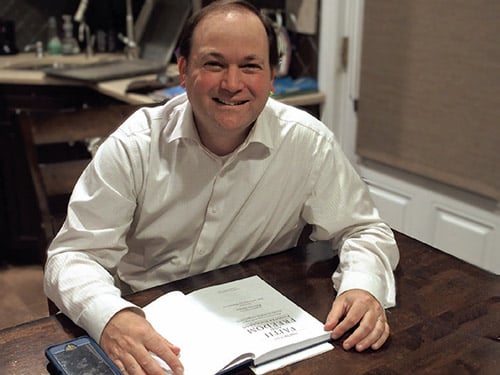

The wisdom of an author can reach into your heart and mind, shaping your views and changing your life. It is not uncommon for people to read all the works of a writer they admire. But Dr. Reuven Mohl went further after becoming dedicated to the teachings of Rabbi Eliezer Berkovits. Dr. Mohl, who lives in Teaneck with his wife and three children, has just edited and published “Faith and Freedom Passover Haggadah” (Urim Publications), where he linked passages of Rabbi Berkovits’ writings as commentary to the Haggadah text.
Rabbi Berkovits studied under Rabbi Yechiel Yaakov Weinberg at the Hildesheimer Rabbinical Academy in Berlin and received his Ph.D. in philosophy from the University of Berlin in the 1930s. After holding rabbinical positions in Berlin, England, Australia and Boston, he became chairman of the Jewish philosophy department at the Hebrew Theological College in Skokie, Illinois. In 1976, he made aliyah with his family and passed away in Israel in 1992.
According to Mohl, Rabbi Berkovits was outspoken in his beliefs and innovative in his approach, which caused controversy, but also discussion and debate. He wrote a book on women and Jewish law, responding to women’s new opportunities within halacha. He wrote a scholarly book in Hebrew called “Conditionality in Marriage and Divorce” trying to solve the agunah problem by retroactively annulling marriages. He wrote another book analyzing and interpreting his views of the development of halacha. “Many tried to stifle his opinions but thankfully that did not stop him,” said Mohl. “He touched topics that others were afraid to discuss within a halachic framework. He was at the forefront of many subjects that we grapple with today.”
Mohl, a practicing dentist in Manhattan who has semicha from Rabbi Zalman Nechemia Goldberg, has studied all of Rabbi Berkovits’ 19 books. “His theology runs from the Holocaust to the state of Israel, and also how God allows man to have free choice. God is separate from man, which gives human beings the freedom to choose,” said Mohl, “Rabbi Berkovits wrote that God gave us Halacha to transmit from generation to generation. He believed that we are co-creators with God and that is a big responsibility we have: the ability to create and make an impact.”
As Mohl read through Rabbi Berkovits’ oeuvre, he began to note similar themes to those of the Haggadah. “The Haggadah is the beginning of Jewish persecution and also the emergence of a nation in our homeland of Israel,” Mohl observed. “The themes of Jewish suffering and redemption keep repeating themselves.” Mohl highlighted places all over the books, noting which excerpts related to specific sections of the Haggadah.
Dr. Mohl approached the Berkovits family members who were happy that this Haggadah would bring a resurgence of interest in their father’s works, which they hope will be shared and discussed. Two of Rabbi Berkovits’ children wrote a personal forward to the Haggadah.
“Faith and Freedom” contains the complete text of the Haggadah in both Hebrew and English, with bolded phrases used as subheads to guide the reader to which words have commentary. Each excerpt has the exact citation and page the Berkovits’ work was taken from. There are close to 100 excerpts taken from Berkovits’ books and articles, with a bibliography at the end of the Haggadah.
For example, in the “Motzi” before the Shulchan Orech (festive meal), the phrase “…who brings forth bread from the earth” is in bold. Mohl links it with an excerpt from “With God in Hell,” about food in the concentration camps during the Holocaust: “…Nothing could threaten the Tzelem Elohim, the Divine Image, more than hunger. Seeing himself as the bearer of God’s image gave many a Jew the strength to retain his humanity in the midst of starvation. And every time his wretched meal was handed to him, he performed what in the conditions of the camp was an act of supreme self-discipline by pausing before eating it in order to say the berachah: “Blessed art thou, Eternal, our God, king of the Universe, who brings forth bread from the earth.”
Mohl enjoyed the process of putting the book together, finding excerpts and placing them with phrases in the Haggadah text, like an elaborate puzzle. “So many people asked me where I found the time. I worked on it at night, I made it a priority. It was a labor of love, making time for something important.”
Mohl suggests reading the book before, or even after, Pesach, for insight into the Haggadah’s themes. And he hopes it serves as an introduction to Rabbi Berkovits for those who would enjoy delving into his works. “Rabbi Berkovits was a prolific writer, and vocal, but his opinions were grounded firmly in his traditional religious beliefs,” said Mohl. “He combined his scholarly background of learning with his immense compassion for others. I hope this book will allow readers to get to know and respect him.”
By Bracha Schwartz
�













